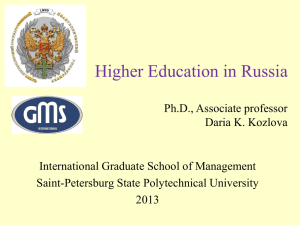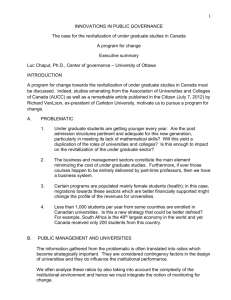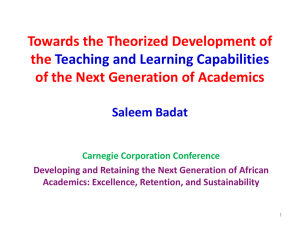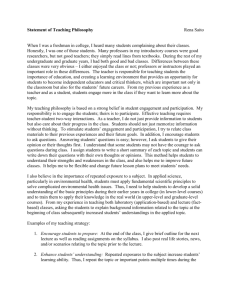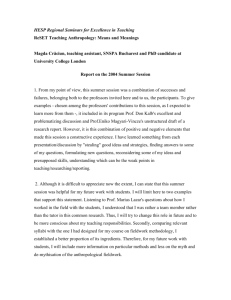Academics without Borders USF-AWB Universitaires sans Front ières
advertisement
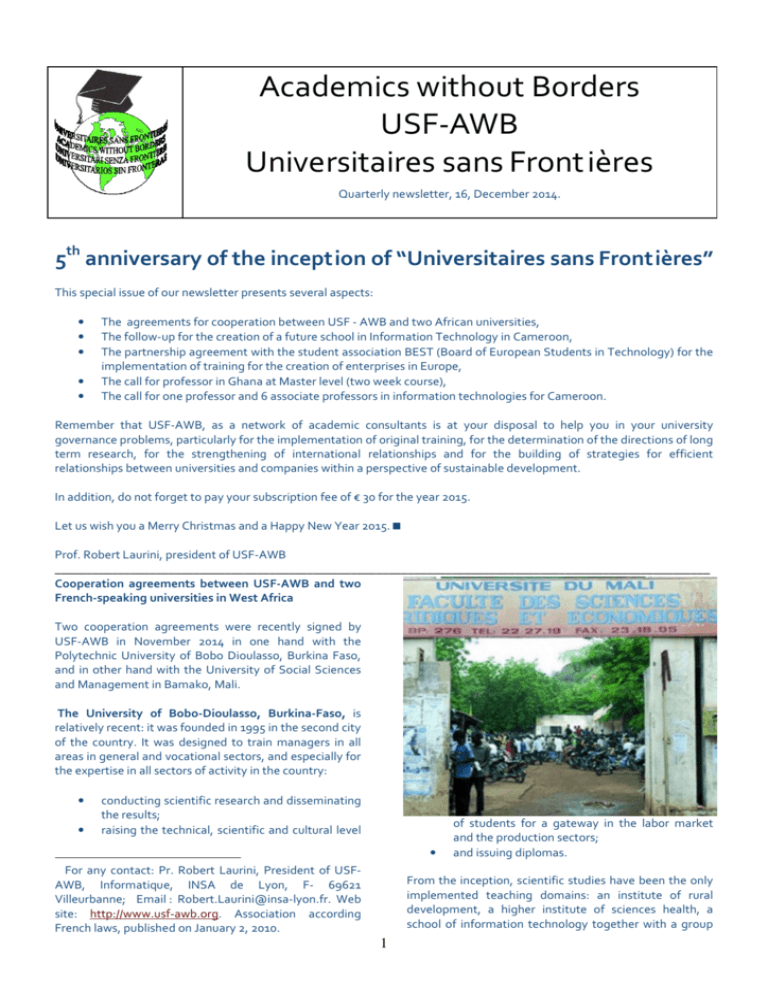
Academics without Borders USF-AWB Universitaires sans Frontières Quarterly newsletter, 16, December 2014. 5th anniversary of the inception of “Universitaires sans Frontières” This special issue of our newsletter presents several aspects: • • • • • The agreements for cooperation between USF - AWB and two African universities, The follow-up for the creation of a future school in Information Technology in Cameroon, The partnership agreement with the student association BEST (Board of European Students in Technology) for the implementation of training for the creation of enterprises in Europe, The call for professor in Ghana at Master level (two week course), The call for one professor and 6 associate professors in information technologies for Cameroon. Remember that USF-AWB, as a network of academic consultants is at your disposal to help you in your university governance problems, particularly for the implementation of original training, for the determination of the directions of long term research, for the strengthening of international relationships and for the building of strategies for efficient relationships between universities and companies within a perspective of sustainable development. In addition, do not forget to pay your subscription fee of € 30 for the year 2015. Let us wish you a Merry Christmas and a Happy New Year 2015. Prof. Robert Laurini, president of USF-AWB ________________________________________________________________________________________________________ Cooperation agreements between USF-AWB and two 1 French-speaking universities in West Africa Two cooperation agreements were recently signed by USF-AWB in November 2014 in one hand with the Polytechnic University of Bobo Dioulasso, Burkina Faso, and in other hand with the University of Social Sciences and Management in Bamako, Mali. The University of Bobo-Dioulasso, Burkina-Faso, is relatively recent: it was founded in 1995 in the second city of the country. It was designed to train managers in all areas in general and vocational sectors, and especially for the expertise in all sectors of activity in the country: • • conducting scientific research and disseminating the results; raising the technical, scientific and cultural level • 1 For any contact: Pr. Robert Laurini, President of USFAWB, Informatique, INSA de Lyon, F- 69621 Villeurbanne; Email : Robert.Laurini@insa-lyon.fr. Web site: http://www.usf-awb.org. Association according French laws, published on January 2, 2010. of students for a gateway in the labor market and the production sectors; and issuing diplomas. From the inception, scientific studies have been the only implemented teaching domains: an institute of rural development, a higher institute of sciences health, a school of information technology together with a group 1 of studies and research in mechanics and energetics, a laboratory of research and teaching in animal health and biotechnology, a laboratory of studies of the natural resources and environmental sciences. Opening to social sciences was made more recently: a faculty of laws and economic sciences exists since only three years. Cameroon The vision promoted by the ISATIC project (Higher African Institute for the of information and Knowledge Technologies) in Douala, Cameroon, is to provide answers with a direct link between training and the employability of young people in Africa, i.e. taking account of the issues of African economy for training and employability. This new faculty has presently approximately 2000 students, supervised by less than 10 academics, all young doctors or PhD candidates. Supports of external academics are therefore needed, in particular from the University of Ouagadougou and partner universities. The University of Social Sciences and Management in Bamako (USSGB), Mali, results from the outbreak made five years ago of a unique university into 4 separate universities. The USSGB regroups a faculty of Economic Sciences and Management, a University Management Institute and a Faculty of History and Geography. Globally speaking, this university is facing multiple problems and in particular understaffing and lack of supervision. There are approximately 39,000 students for 236 academics. One can consider to these difficulties the lack of classrooms and the lack of documentation resources and publications accessible to students and professors. The USSGB is just transferring to the Bologna system (Bachelor-Master-PhD). Adaptations are progressively made in this area. Indeed, reports of the African Development Bank and of the Mc Kinsey Global Institute for 2012 establish respectively the following observations: • • • For these two universities, the cooperation with USFAWB is the opportunity to receive additional support of • • 200 million young Africans mean 200 million of opportunities; the double crisis of unemployment and the shortage of skills: Africa will create 54-72 M paid and stable jobs in 2020; Growth sectors are agriculture, communication, trade, health and hospitality, 10 years ago, only 32% of Africans had a high or greater school education; by 2020 this number will rise to 48%. Therefore, it is essential to create programs that develop the skills required by the industries and African development Furthermore, the conclusion of the symposium held 12-17 February 2012 in Burkina Faso organized by the Association for the development of Education in Africa (ADEA) stipulates that an effective response to the education and training systems should be designed and built. academics in various disciplines, support to the establishment of new Master systems, strengthening research, access to documentary sources which are completely absent. Then should we innovate for Africa or in Africa? Furthermore, the Polytechnic University of BoboDioulasso is located in the region of Hauts-Bassins, partner of Rhône-Alpes region. Some cooperation exists with the Timbuktu region, and the University of Bamako is the closest to Timbuktu. The possibility to implement partnerships between USF-AWB/France and these universities will be soon considered. For us, Africa must know first to use its own resources, and the ISATIC project will emphasize this aspect through the following three pillars, which are at the basis of its goals and its issues. 1 - A higher African education system to develop and support sector growth Dr. Xavier ALPHAIZE, Member of USF-AWB. ________________________________________________ A new institute for Information technolgy in Douala, The development of ICT and all the digital technologies in expanding sectors is a proven source of growth for Africa, 2 at the same time bringing the problem of local skills to meet these needs. It is therefore necessary to have technicians and high-level computer executives trained to meet identified local needs. All that leads to advocate for the constitution of an African curriculum specialized in information technologies. by encouraging their mobility and their intercultural communication. BEST uses English as the only official language. Presently BEST has 95 BEST local groups, in 33 European countries, and more than 3,000 active members, involving approximately 1 700 000 students. Refer to http://www.best.eu.org/ for more details. 2 – A training project is immersed in the world of business by entrepreneurship and innovation The BEST local groups organize regularly high-level courses for members of the whole BEST. The higher education program is designed by practitioners of information technology from the world of business and universities, in order to meet the current and future needs of local companies, the new challenges of African economies, at the time when Africa becomes, according to some Experts, the continent of the future. An agreement has just been signed between BEST Lyon The curriculum will include an internship in a company according to the levels of the students. A junior enterprise will be attached to the Institute by which students will meet practical requirements and modes of operation of enterprises. They can earn themselves a share of the financing of their studies, which will facilitate access to the Institute for modest families (including those who cannot send their children to make higher education in Europe). and USF-AWB. The role of USF-AWB will be to help identify professors and teachers to set up those courses. As early as February 2015 , a week-long training will be implemented for the creation of enterprises in Europe. If the BEST-Lyon and USF - AWB partnership works very well, the agreement will be extended to the whole BEST organization. 3 – An Institute in partnership with the world By the choice of professors (mix between African academics and Europeans coming from companies and other universities, the Institute well be networked with the major global shareholders of the University and the company. By agreements of cooperation with other institutes, schools or universities throughout the world (mobility and student exchange) and incubators (sharing experiences, as examples from Creative Valley in France), through the use of modern technological and educational media, ICT and e-learning including courses in the form of video conferencing and virtual classes, and courses on electronic open access, Open Source, MOOC, etc.), Pr. Robert Laurini President of USF-AWB ________________________________________________ Ghana - ICT COMPUTER SCIENCE/INFORMATION TECHNOLOGY Volunteer to teach a graduate course University of Cape Coast, Cape Coast, Ghana January 2015 Our Canadian sister association Academics Without Borders-Universitaires sans Frontières (AWB-USF) is looking for a volunteer to teach a course in the Department of Computer Science and Information Technology (DCSIT) at the University of Cape Coast (UCC) in Cape Coast, Ghana in January 2015. With the help of USF-AWB, the Institute will open its doors in the fall of 2015. In the meantime, programs have been developed for issuing three diplomas, technicians, enterprise-oriented Bachelor and Master degrees. Background: Ghana is one of the most secure and relatively prosperous African countries. It is developing rapidly and needs people with advanced degrees in CS/IT, both to work in many key positions in both the public and private sectors, and to educate others. As there was previously no graduate programme in CS/IT in Ghana, those who wished to get an advanced degree had to leave the country to study. Most interested candidates, however, cannot leave for personal reasons or teaching obligations, and if they do leave, they often do not return. The Project: The DCSIT would like to upgrade the qualifications of its instructors from M.Sc. (mostly from British universities) to Ph.D., which would enable the Department to create a graduate programme. The plan is to have a transitional doctoral programme that will allow For the implementation of this dynamics, the profiles of the future ISATIC full professor and associate professors to be recruited are given in the article Cameroon-ICT of the newsletter. Jean-Gervais Yoyo Moutomé, Founder of ISATIC. Robert Laurini, President of USF-AWB ________________________________________________ USF-AWB and BEST The Board of European Students of Technology (BEST) is an international, non-governmental, apolitical organization, non profit, managed entirely by students. It strives to make technology students more open abroad 3 the upgrade. To fill the gaps the current instructors may have in fundamental areas, some intensive basic courses are being offered in January of each year. The courses are also open to recent graduates of the undergraduate program in DCSIT, who will be able to use the course credit towards an advanced degree once a DCSIT graduate programme is approved. Potential doctoral candidates from other Ghanaian universities may also take the courses and then work on Ph.D.’s in the DCSIT graduate program. The main language of instruction will be French, but certain courses may be given in English. Profile of the Director of studies If you have a PhD in computer science with a strong experience at Bachelor and/or Master level of at least during 10 years, your profile interests us; you will first ask to do the following tasks: AWB-USF and UCC are looking for a professor or a post doc in either CS or IT to teach a two-week intensive course in any area considered as fundamental for a PhD candidate in CS or IT (teaching period : January 5th to th January 17 – it might be possible to move it to January th th 12 to January 24 ). • • • • • UCC will provide housing and a stipend to cover local expenses and AWB-USF will cover all the other expenses (costs of visas, vaccinations, travel and health insurance, travel medications, ground transportation, and airfare). More information will be sent to anyone interested to teach at this period of time. • • • • • For more information about UCC and DCSIT, you can also contact directly Jojo Moses Eghan, the Head of the DCSIT: eghan_jm@yahoo.com/meghan@ucc.edu.gh. This project is supported by the Embassy of France in Accra, the University of Cape Coast and AWB-USF. implementing teachings, sizing computer equipment, defining practical training, assisting in the recruitment of associate professors and other part-time teachers, defining the information system and related training software products, organize practical work rooms, assign courses, set the agendas for each teacher, organize the recruitment of students, and preparing the grand opening for year 201516.. Then, he/she should be preparing the following year with increased number of students. Hire date: early 2015. Profiles of the 6 associate professors If you are interested, you should contact Corrie Young, the Institutional Manager for UCC, at AWB-USF, as soon as possible: cyoung@awb-usf.org Please send her your CV and a letter of motivation with the names of two referees and a description of the course that you propose to teach together with a copy to dominique.sotteau@okofoto.com. To assist the Director of studies, we are looking for associate professors having a Ph.D. in computer science/information technology, and able to teach in the following areas: computer science, programming, computer architecture, mathematics, operating systems, databases, telecommunications, analysis and design, information systems, software engineering, Internet and web applications, located services, mobile applications, cloud computing, management, production management, information technology for precision farming, etc. Note that despite the recent Ebola outbreak in West Africa, Ghana does not share a border with any of the countries to date affected by the Ebola outbreak. ________________________________________________ Cameroon - Information Technology Hire date; summer 2015. The ISATIC of Douala, Cameroon, is looking for its Director of studies (professor) and 6 associate professors in information technology Procedure All applicants must send a letter of application, CV and supporting documents before February 1, 2015 to: The Higher African Institute for Information and Knowledge Technologies (ISATIC) will open its gates in the fall of 2015 to train technicians and engineers as explained previously. This institute which is private according to Cameroonian laws, is looking for one professor and 6 associate professors in computer science/ information technology and will develop syllabi at Bachelor and Master levels, with an initial class of 50 students for Bachelor and 25 at Master level. • • 4 Jean-Gervais Yoyomoutome, director of ISATIC: yoyomoutome@association-isatic.org Robert Laurini, president of USF-AWB: Robert.Laurini@insa-lyon.fr
